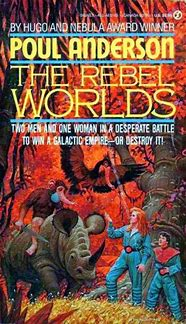In the Technic History:
a Merseian has a personal name, a nickname and a Vach;
an Ythrian has a personal name and a choth;
a tripartite Didonian is named by a phrase descriptive of his origin;
a Shalmuan seems to have a single name.
We know of two Shalmuans:
Chives, Flandry's servant;
Ch'kessa, Prime in Council of the Clan Towns of Att.
"Chives" seems to be influenced by "Jeeves." In many works, we were never told Jeeves' first name and it was as if he was above such things. However, for the revelation of his first name, read PG Wodehouse's Much Obliged, Jeeves.

3 comments:
It used to be a British quirk that middle to upper-class people usually called servants (and other people who they didn't know well or weren't close relatives of) by their last names. Prefixed by "Mr." or "Mrs." if they were of higher status, or older.
At a British-style school I attended in Kenya in the 1960's, we all called each other just by our last names unless we were close personal friends; the teachers ("masters", there and then) called us by our last names too. If there were several brothers, they'd be called things like "Smith Maximus" (the elder) and "Smith minimus" (the younger). We called the teachers "sir", of course; the headmaster addressed them as "Mr. X".
One distinctive aspect of English-language personal names is that they're mostly "meaningless" -- that is, they don't constitute a meaningful phrase in English, they're just an arbitrary set of syllables.
This is because English people rapidly switched to using French and/or Biblical names after 1066.
Previously they'd used names of Germanic origin like Aelfred -- which means "counseled by the elves". Or Eric, originally meaning "Ruler of All".
(Incidentally, Old English names became fashionable again in the Victorian period, but they'd been out of use for a long time before that. When they were revived, people generally didn't know their original meaning.)
Our names originally do mean something, but in another language.
Eg., John is derived from French Jehan, but that's from the Hebrew Yohanan, which means "Jehovah has Favored".
Biblical names beginning with "J" derive from the Tetragrammaton, which originally meant something.
Post a Comment